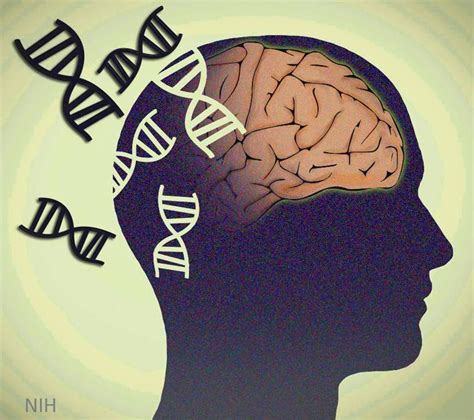Mental health disorders can have a profound impact on individuals and their loved ones, yet the underlying factors that contribute to these conditions are still not fully understood. In recent years, there has been a growing interest in the role of genetics in mental health, as researchers aim to uncover the genetic markers and variants associated with various disorders. This blog post will explore the influence of genetics on mental health, from identifying genetic variants to understanding the heritability of these disorders. We will also delve into the intriguing area of gene-environment interactions and how they can impact mental health. Additionally, we’ll discuss the implications of genetic testing for mental health diagnosis and the potential for personalized treatments based on genetic research advancements. Join us as we investigate the fascinating and rapidly evolving field of genetics in understanding mental health disorders.
Table of Contents
The influence of genetics on mental health
Genetics plays a crucial role in determining an individual’s mental health. The influence of genetics on mental health is evident in the way certain mental health disorders run in families. It is widely acknowledged that certain mental illnesses such as depression, anxiety, schizophrenia, and bipolar disorder have a strong genetic component. Individuals with a family history of these disorders are at a higher risk of developing them themselves. This highlights the significance of understanding the genetic factors at play in mental health.
Furthermore, genetic research has revealed the presence of specific genetic markers that are associated with an increased risk of mental health disorders. These markers can help identify individuals who may be predisposed to such conditions, allowing for preventive measures to be put in place. Additionally, by identifying genetic variants associated with mental health disorders, it becomes possible to develop targeted treatments that are tailored to an individual’s genetic makeup, leading to more effective outcomes.
The role of gene-environment interactions in mental health is another aspect that underscores the influence of genetics on mental well-being. While genetics can predispose individuals to certain mental health conditions, environmental factors can also play a significant role in triggering the onset of these disorders. Understanding how genes interact with the environment can provide valuable insights into the development and progression of mental illnesses.
Overall, the influence of genetics on mental health is multifaceted and integral to our understanding of mental well-being. As genetic research continues to advance, it holds great promise for personalized mental health treatments and the future of mental health care.
Genetic markers and risk of mental health disorders
Genetic markers play a crucial role in determining the risk of developing mental health disorders. These markers are specific sequences of DNA that can indicate an increased susceptibility to conditions such as depression, anxiety, schizophrenia, and bipolar disorder.
Researchers have identified several genetic variants associated with an elevated risk of mental health disorders. These variants can be inherited from one or both parents and may contribute to an individual’s predisposition to certain conditions.
It is important to note that having these genetic markers does not necessarily mean that a person will develop a mental health disorder. Environmental factors, such as stress, trauma, and substance abuse, also play a significant role in the manifestation of these conditions.
Understanding the genetic predisposition toward mental health disorders can help healthcare professionals provide personalized treatment and intervention strategies for individuals at higher risk. Genetic testing and counseling can also assist in identifying and managing potential mental health risks.
Identifying genetic variants associated with mental health disorders
In recent years, there has been a growing interest in understanding the role of genetic variants in the development of mental health disorders. Researchers have been working to identify specific genetic markers that may increase an individual’s risk of developing conditions such as depression, anxiety, schizophrenia, and bipolar disorder.
Through large-scale genetic studies, scientists have been able to pinpoint certain genes and genomic regions that are associated with an increased susceptibility to mental health disorders. This has opened up new avenues for personalized medicine and targeted treatments for individuals with these conditions.
By identifying these genetic variants, researchers hope to gain a better understanding of the biological pathways involved in mental health disorders. This knowledge could lead to the development of more effective interventions and therapies that specifically target the underlying genetic mechanisms involved in these conditions.
Overall, the identification of genetic variants associated with mental health disorders represents a significant advancement in the field of psychiatric genetics, and holds great promise for improving the diagnosis and treatment of these complex and challenging conditions.
The role of gene-environment interactions in mental health
When considering the role of gene-environment interactions in mental health, it is important to recognize the complex interplay between genetic factors and environmental influences. Genetic predispositions can increase an individual’s susceptibility to mental health disorders, but the manifestation of these conditions often depends on exposure to certain environmental stressors.
For example, a person with a genetic risk for depression may only develop the disorder after experiencing significant trauma or chronic stress. On the other hand, individuals without this genetic predisposition may remain resilient even under similar environmental pressures.
Research has shown that certain environmental factors, such as childhood adversity, socio-economic status, and exposure to toxins, can interact with genetic vulnerabilities to elevate the risk of mental health disorders. Understanding these gene-environment interactions is crucial for developing targeted interventions and personalized treatments that account for both genetic and environmental influences on mental health.
By studying these interactions, researchers and healthcare professionals can gain insights into the mechanisms underlying mental health disorders, ultimately leading to more effective prevention strategies and treatment approaches.
Genetic testing and its implications for mental health diagnosis
Genetic testing has become an increasingly popular tool for diagnosing and understanding mental health disorders. With the advancement of technology, it is now possible to identify genetic markers associated with various mental health conditions, allowing for a more personalized and effective approach to treatment.
By conducting genetic testing, healthcare professionals are able to better understand an individual’s risk of developing certain mental health disorders. This can not only aid in early detection and intervention, but also in the development of targeted genetic counseling strategies to help individuals manage their condition.
Furthermore, genetic testing can also have implications for epigenetics – the study of how gene expression affects mental health. By identifying specific genetic variants associated with mental health disorders, researchers can gain insights into the mechanisms of gene-environment interactions and the heritability of these conditions.
As genetic research continues to advance, the implications of genetic testing for mental health diagnosis are likely to become even more profound. From personalized treatment options to a deeper understanding of the role of genetics in mental health, genetic testing offers a promising path toward improving the quality of care for individuals with mental health disorders.
Genetic counseling for individuals with mental health disorders
Genetic counseling is a specialized area of healthcare that focuses on helping individuals and families understand the role of genetics in their mental health disorders. This type of counseling provides information and support to people who may be at risk for a variety of mental health conditions due to their genetic makeup. By working with a genetic counselor, individuals can gain insight into their risk factors and make informed decisions about managing their mental health.
One of the key aspects of genetic counseling for individuals with mental health disorders is the process of identifying genetic markers and assess the risk of developing certain conditions. Genetic counselors can help individuals interpret their genetic test results and understand the implications for their mental health. This knowledge can empower individuals to take proactive measures to manage their mental health and seek appropriate treatment if necessary.
It is important to recognize that the role of gene-environment interactions in mental health disorders is complex and multifaceted. Genetic counselors play a crucial role in helping individuals navigate this complexity and understand how their genetic predispositions interact with environmental factors to influence their mental health. By providing personalized guidance and support, genetic counselors can empower individuals to make informed choices that promote their mental well-being.
Overall, genetic counseling holds great promise for individuals with mental health disorders by providing them with valuable insights into their genetic predispositions and helping them make informed decisions about their mental health. As advancements in genetic research continue, the field of genetic counseling is likely to play an increasingly important role in personalized mental health care.
Understanding the heritability of mental health disorders
When it comes to mental health disorders, it’s important to understand the role that genetics play in the development of these conditions. Research has shown that there is a strong heritable component to many mental health disorders, meaning that individuals with a family history of a particular disorder are at a higher risk of developing the condition themselves. Understanding the heritability of mental health disorders is crucial for identifying at-risk individuals and developing targeted treatment and prevention strategies.
Studies have found that certain mental health disorders, such as depression and schizophrenia, have a significant genetic component. This means that individuals who have a close relative with one of these disorders are more likely to develop the condition themselves. Additionally, research has identified specific genetic markers that are associated with an increased risk of certain mental health disorders, further supporting the role of genetics in the development of these conditions.
Understanding the heritability of mental health disorders also involves recognizing the complex interplay between genetics and environmental factors. While genetics may predispose an individual to a particular disorder, environmental stressors and experiences can also influence the expression of these genetic traits. This highlights the importance of considering both genetic and environmental factors when assessing an individual’s risk for a mental health disorder.
The heritability of mental health disorders has significant implications for diagnosis and treatment. By understanding the genetic factors that contribute to these conditions, healthcare providers can better identify at-risk individuals and develop personalized treatment plans. Additionally, ongoing genetic research advancements continue to shed light on the complex mechanisms underlying mental health disorders, offering hope for improved diagnostic techniques and targeted interventions in the future.
Epigenetics: How gene expression affects mental health
Epigenetics is a fascinating field that examines how gene expression can be influenced by environmental factors and lifestyle choices, and its impact on mental health is substantial. Research has shown that epigenetic changes can play a critical role in the development of various mental health disorders, including depression, anxiety, and schizophrenia. Understanding the mechanisms through which gene expression is altered by environmental factors can provide valuable insights into the underlying causes of these disorders.
The epigenetic changes that occur in response to environmental influences can have long-lasting effects on mental health. For example, studies have found that individuals who experience chronic stress may exhibit changes in their DNA methylation patterns, which can contribute to an increased risk of developing anxiety and mood disorders. Similarly, the choices we make in terms of diet and exercise can also impact our gene expression through epigenetic mechanisms, influencing our susceptibility to mental health conditions.
Furthermore, the study of epigenetics has shed light on the potential for epigenetic therapy as a novel approach for treating mental health disorders. By targeting the specific epigenetic mechanisms that contribute to these conditions, researchers are exploring the possibility of developing new therapeutic interventions that can modulate gene expression, offering promising avenues for personalized treatment strategies.
Ultimately, the emerging field of epigenetics is offering a new perspective on the complex interplay between genetics, environment, and mental health. By understanding how gene expression is influenced by external factors, we can gain valuable insights into the underlying mechanisms of mental health disorders, paving the way for new approaches to prevention and treatment.
Genetic research advancements for personalized mental health treatments
Genetic research has made significant advancements in understanding the links between genetics and mental health, leading to the development of personalized treatments for individuals with mental health disorders. Through the study of genetic markers and their associations with various mental health conditions, researchers have been able to identify targeted treatments that can be tailored to an individual’s specific genetic makeup.
One of the most promising areas of genetic research for personalized mental health treatments is the identification of genetic variants associated with mental health disorders. By studying the specific genetic components that contribute to conditions such as depression, anxiety, schizophrenia, and bipolar disorder, scientists are gaining insights into potential treatment options that may be more effective than traditional approaches.
Additionally, the role of gene-environment interactions in mental health has been a focus of genetic research, leading to a better understanding of how an individual’s genetic predisposition may interact with environmental factors to influence mental health outcomes. This research has the potential to inform personalized treatment plans that take into account both genetic and environmental factors.
Overall, genetic research advancements are paving the way for more personalized and effective treatments for mental health disorders. As the field continues to evolve, individuals with mental health conditions may benefit from tailored interventions that address their unique genetic makeup and environmental influences.
Genetic studies and the future of mental health care
Genetic studies have transformed the way we understand and approach mental health care. By examining the role of genetics in mental health disorders, researchers have been able to identify key genetic markers that can help predict an individual’s susceptibility to certain conditions. These findings have paved the way for more personalized and targeted mental health treatments, with the potential to revolutionize the field.
Furthermore, genetic studies have shed light on the heritability of mental health disorders, providing valuable insights into the complex interplay between genes and the environment. This understanding has led to the development of genetic counseling services for individuals with mental health disorders, aimed at providing support and guidance based on an individual’s unique genetic profile.
As technology continues to advance, genetic research is expected to play an increasingly integral role in the future of mental health care. From the exploration of epigenetics and how gene expression affects mental health, to the identification of genetic variants associated with specific disorders, ongoing genetic studies hold immense promise for the development of more effective and targeted treatments.
Ultimately, the potential impact of genetic research on the future of mental health care is vast. By leveraging the insights gained from genetic studies, clinicians and researchers alike have the opportunity to tailor interventions and support services in a way that is truly personalized to an individual’s genetic makeup, offering hope for improved outcomes and enhanced quality of life for those affected by mental health disorders.





